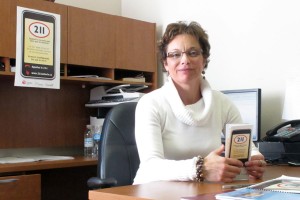211 number connects local residents with services

BELLEVILLE, Ont. (21/11/11) Judi Gilbert is the executive director of the Quinte United Way. The charitable organization is a partner in the 211-Ontario initiative, an information and referral hotline launched in Hastings and Prince Edward County Nov. 9. "The hotline is a way for people to connect with social services quickly," Gilbert said. "It's like a one-stop shop." Photo by Renee Rodgers.
By Renée Rodgers
Local residents who don’t know where to turn for help can now call a three-digit number that will connect them with information about a wide variety of social services.
“It used to be that people would make seven different calls before they could find the right service,” said Destiny Bedwell, a spokeswoman for 211 Ontario. The 211 hotline aims to make access to help easier.
The government-funded service was officially launched in Hastings and Prince Edward County Nov. 9. It’s available 24/7, and is staffed by information and referral specialists who are highly knowledgeable about social services available in the province. The specialists will assess each caller’s needs and answer questions about everything from health to employment to immigration to social assistance, Bedwell said.
The specialists will have access to information about local services through a database provided by Volunteer & Information Quinte, a local not-for-profit agency, which operates a similar hotline for local residents looking for information about social services.
Brenda Snider, Volunteer & Information Quinte’s executive director, said 211 does not replace the local agency’s information service, but works in conjunction with it. Since V&IQ is the exclusive provider of local data to 211, people will be able to call either number and receive the same information, said Snider.
“It’s not a competition in any way shape or form,” she said. “It is about another tool so that people have access.”
Snider said the 211 number does have a couple of advantages over the local hotline. The three-digit number is available at all hours and in multiple languages.
Brandi Hodge, director of community engagement at the United Way of Quinte, said there are other benefits to 211 as well. Information and referral specialists do not just answer questions. They are also trained to ask the right follow-up questions, another advantage over the local hotline.
“If someone calls looking for a food bank, they will absolutely give them the data on the food bank, where to call, the address, all of those things,” Hodge said. “But they’ll also talk to them about what’s driving their need for that food bank. If it’s employment-related issues, they can give them employment services. It’s the follow-up that will happen at the 211 level that doesn’t necessarily happen when people make that quick phone call for information locally.”
The United Way was instrumental in bringing the 211 service from the United States to Canada in 2002. Hodge said calls to the United Way for information about social services will now be directed to 211. The 211 operators will be more equipped to answer a variety of questions about social services.
Snider said Volunteer & Information Quinte receives about 750 calls for information per year. She said she has not yet seen a drop in the amount of phone calls the local service has received since the advent of 211. It’s hard to say at this point, she said, if the number of phone calls will drop – if at all.
“If people find it easier to call 211 then that’s what will happen,” she said. “Some people have used us before. They know who we are and they’ll call us because we are an information service as well. We really don’t know what it’s going to look like.”
 Print This Post
Print This Post






